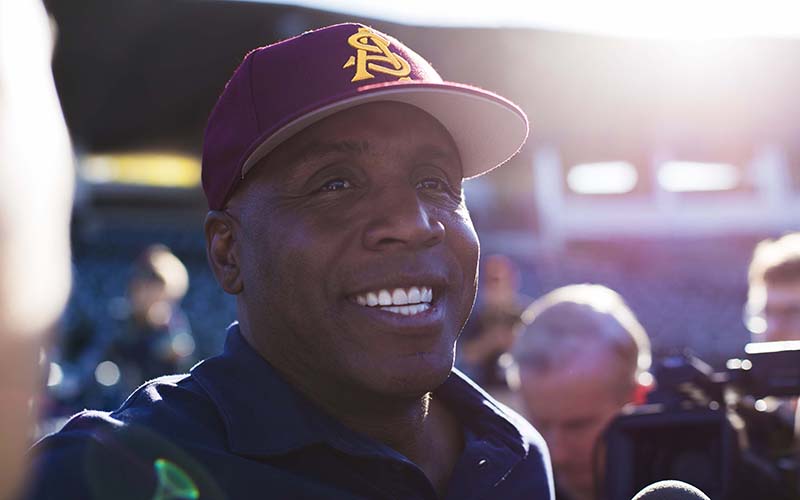
After Barry Bonds failed to get the the 75% mark of votes required for election into the Hall of Fame, former Arizona State baseball players came to his support. (File photo by Blake Bernard/Cronkite News)
PHOENIX – Although Cooperstown, New York, is the ultimate destination for any professional ballplayer, Barry Bonds and his fellow competitors know the path to the National Baseball Hall of Fame isn’t an open highway.
The steroid era that Bonds reigned over has created a complicated discussion full of switchback arguments and slippery logic. On Jan. 25, Bonds failed to reach the 75% mark of votes required for election into the Hall of Fame. It was the former Arizona State star’s last time on the ballot, and the snub has troubled some ASU baseball alumni.

Former Arizona State baseball player Andre Ethier says he “only played a fraction of the time of what Barry (Bonds) did and 12 years was tough on my body and tough on myself.” (Photo by Amanda Valle/Cronkite News)
“It’s unbelievable because I got to see (Bonds’ career) full circle,” said Los Angeles Dodgers outfielder Andre Ethier, a former ASU standout. “It means a lot but it is just a tough situation where baseball is not where it has been the past 20 years. There are people who say that the game shouldn’t have been played a certain way or something like that. But hey, it is tough to go out there and play every day. I know it. I only played a fraction of the time of what Barry did and 12 years was tough on my body and tough on myself.”
During his career with the Pittsburgh Pirates and San Francisco Giants, Bonds hit a record 762 home runs and collected 2,935 hits and 1,996 RBI. For all his transcendence at the plate, he became a lightning rod for the debate over allowing steroid users into baseball’s shrine. Many consider Bonds to be one of the greatest hitters ever and say electing Bonds into the Hall of Fame should be a no brainer. However, after 10 years on the ballot, Bonds never secured the needed votes.
Support for the slugger from professional athletes quickly followed his most recent rejection.
Smh….??♂️ https://t.co/6ZSyhiGjfj
— Patrick Mahomes II (@PatrickMahomes) January 25, 2022
This is ridiculous ?? https://t.co/9yp5QqMDLw
— Donovan Mitchell (@spidadmitchell) January 26, 2022
It also came from closer to home. ASU baseball coach Willie Bloomquist, who played professionally for 13 seasons, says Bonds deserves a plaque in Cooperstown beyond a doubt.
“I support Barry because he is a Sun Devil and we want to see him there,” Blomquist said. “The short story is that he dominated his era. Whatever happened in that era happened, but he still dominated it.”
Not all athletes are supportive of Bonds making the Hall of Fame. Former major league outfielder Doug Glanville wrote a piece for ESPN that addressed the casualties that resulted from players cheating with performance enhancing drugs.
“For weeks before the vote was announced,” Glanville wrote, “I imagined watching a parade of PED players walk up to the podium to tell us about their journey, knowing they represent a force that accelerated the demise of so many players who played it straight.”
He added, “When you can cheat your way in, the Hall of Fame feels toothless.”
The player support Bonds did receive may lessen the blow of the results. However, major leaguers don’t get a vote. Only journalists do, which lends itself to a debate of another kind.
Bob Nightengale, an ASU alumnus and USA Today MLB columnist, has been a member of the Baseball Writers’ Association of America (BBWA) for more than 10 years and voted for Bonds every year he was on the ballot.
“He was the greatest player that I have ever seen,” Nightengale said. “You can argue Babe Ruth, but that was pre-integration and everything else.”
Many BBWAA members said they didn’t vote for Bonds or pitcher Roger Clemens based strictly on the steroid suspicions swirling around each. Nightengale shared why he voted the way he did and how he feels about his peers who voted differently.
“I understand where they are coming from,” he said. “They say, ‘We don’t want to have cheaters in the Hall of Fame’ or ‘We believe that anyone who has touched steroids doesn’t belong.’
“However there are plenty of guys in the Hall of Fame who have used steroids or have allegations (against) them. You know we have probably elected six or seven guys with strong steroid suspicions in the past 10 years and they are in, so I don’t know why we are keeping out the two greatest players of the steroid-taking class.”
One player’s inclusion in this election raised some eyebrows about Bonds’ exclusion. David Ortiz, who became a first-ballot Hall of Famer, was suspected of PED use after a positive test in 2003 while with the Boston Red Sox, although it still isn’t known what substance the test identified.
Players took to Twitter arguing that if Ortiz was voted in, Bonds and others should be elected, too. San Francisco Giants pitcher Alex Wood said if Oritz “can get into the HOF on the first try with a positive test on his resume then how in god’s name does Bonds and Clemens not get in? The system is now officially broken in my eyes.”
You can’t tell the story of baseball without David Ortiz. Congrats to him. But if he can get into the HOF on the first try with a positive test on his resume then how in gods name does Bonds and Clemens not get in? The system is now officially broken in my eyes.
— Alex Wood (@Awood45) January 25, 2022
Such responses sparked conversations about what the Hall of Fame really represents, and the decisions that go into choosing which players are elected.
“To me you have to be a representative of the game on the field,” Bloomquist said. “Not everyone is going to like everyone’s personality. Everyone has different views. You can’t let that judge the baseball player on the field.”
Nightengale said the Hall of Fame elections always bring up spirited conversations during the voting process, and people have healthy debates.
Although Bonds lost his chance for the Hall of Fame the traditional way, he still has an opportunity. His name will go to the Era Committee, made up of past players, managers, umpires and executives, where he will have another chance to gain entrance.
“I know in the future Barry will get his shot and get in,” Ethier said. “It is up to the point where the player recognizes the stuff he has done and what he has done for the game.”
Bonds gave a boost to the popularity of baseball, but is still waiting to be boosted by the popular vote on the Hall of Fame ballot.
